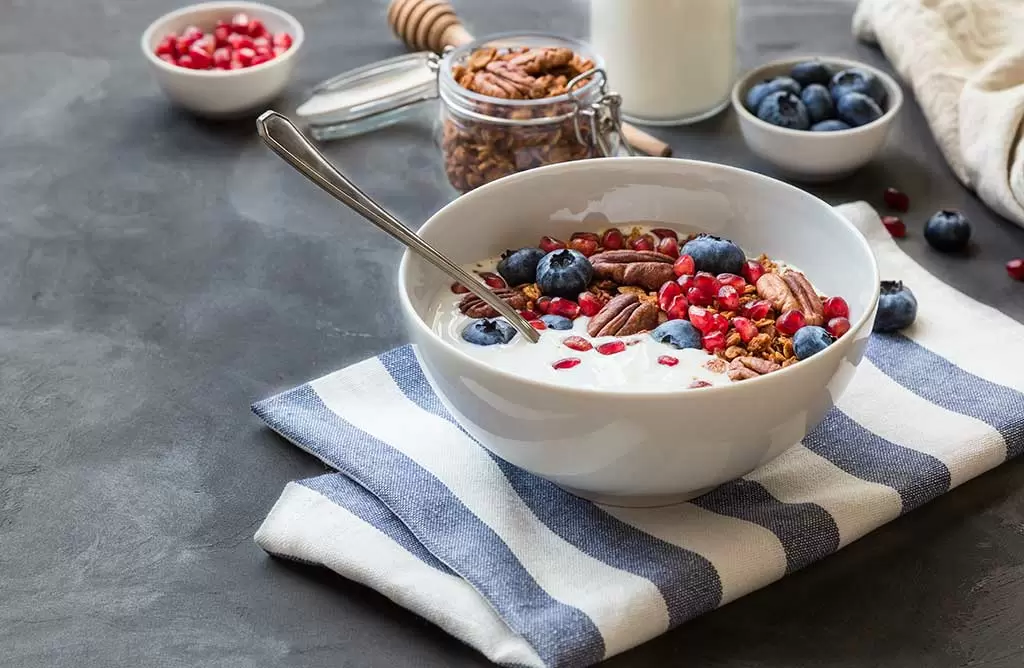Eating balanced meals is like building a strong house. Just as a house needs a solid foundation, your body needs the right mix of foods to stay healthy and manage weight.
A balanced meal includes a variety of foods, such as fruits, vegetables, proteins, and grains. Combining these foods provides your body with the nutrients it needs to feel energetic and satisfied.
This helps reduce cravings and supports a healthy lifestyle.
Let’s explore why creating balanced meals is important for achieving your weight management goals while enjoying delicious food every day!
Nutrient Density
Nutrient density means getting the most vitamins and minerals from your food. When you eat balanced meals, you choose foods rich in nutrients, such as fruits, vegetables, whole grains, and lean proteins.
These foods provide essential nutrients without adding too many calories, helping your body stay healthy. For instance, a salad with leafy greens, colorful veggies, and a source of protein is packed with nutrients.
Eating nutrient-dense foods can boost your immune system and energy levels, allowing you to feel good and manage your weight better. It’s all about making smart choices with your meals.
Sustained Energy
Sustained energy means having steady energy throughout the day. Eating balanced meals that combine proteins, fats, and carbohydrates helps keep your energy levels stable.
For instance, a meal with whole grains, healthy fats, and lean protein provides lasting energy. This prevents quick energy drops that can make you feel tired. Without steady energy, you may be tempted to snack on unhealthy foods.
Balanced meals also help you stay focused and active. When you feel energized, you can do more of what you love. Therefore, making balanced meals is important for staying energized all day long.
Portion Control
Portion control means eating the right amount of food. Balanced meals make it easier to know how much to eat. They include a mix of proteins, grains, and vegetables. This combination helps you feel full without overeating.
For example, a plate with a small serving of rice, some chicken, and lots of vegetables can be satisfying. By controlling portions, you consume fewer calories while still getting the nutrients you need.
This approach helps you manage your weight better. When you pay attention to portion sizes, you enjoy your food more and feel good afterward. Overall, portion control is key to healthy eating.
Improved Satiety
Improved satiety means feeling full and satisfied after eating. When you consume balanced meals that include fiber-rich foods like fruits, vegetables, and whole grains, fiber takes longer to digest.
This helps you feel full for a longer time. For instance, a meal with brown rice, beans, and plenty of veggies can keep you satisfied. When you feel full, you’re less likely to snack on unhealthy foods later, which helps you avoid overeating and manage your weight.
Additionally, eating fiber benefits your body by supporting digestion and keeping your stomach happy. In summary, more fiber means better satiety!
Metabolism Support
Balanced meals support your metabolism, which is how your body uses energy. When you eat a mix of proteins, fats, and carbohydrates, it helps your body work better. For example, proteins build muscle, which burns more calories.
Healthy fats provide energy, while carbohydrates give quick energy for daily activities. Eating balanced meals can speed up your metabolism. This means your body burns calories faster.
When your metabolism works well, it helps with weight loss and maintenance. So, a good mix of foods can keep your body strong and healthy. Eating right boosts your metabolism and helps you feel great!
Reduced Cravings
Balanced meals can reduce cravings for unhealthy foods. When you eat a mix of proteins, fats, and carbohydrates, it keeps your blood sugar steady. This helps you avoid sudden hunger.
For example, a meal with chicken, vegetables, and whole grains gives you lasting energy. When your blood sugar is stable, you don’t feel the urge to snack on sweets or junk food.
This makes it easier to stick to healthy eating. Less craving means fewer unhealthy choices. By choosing balanced meals, you can enjoy your food while also keeping cravings away. It helps you stay on track with your weight goals!
Better Mood
Eating balanced meals can significantly improve your mood by providing your brain with the nutrients it needs to function optimally. A mix of fruits, vegetables, whole grains, and proteins contains essential vitamins that support brain health.
For example, foods rich in omega-3 fats, such as fish or walnuts, are particularly beneficial for mental well-being. When you maintain a good mood, you are less likely to resort to emotional eating due to stress or sadness, allowing you to make better food choices.
By enjoying balanced meals, you not only support your mood and mental health but also enhance your ability to stay focused and positive every day.
Muscle Preservation
Eating enough protein is important for keeping your muscles strong. When you have balanced meals that include protein, like chicken, beans, or nuts, you help your body build and repair muscles.
This is especially important when you are losing weight. If you don’t eat enough protein, your body might lose muscle instead of fat. Keeping your muscles helps your metabolism stay high, which means you burn more calories.
Balanced meals with protein also make you feel full. This way, you are less likely to snack on unhealthy foods. So, protein is key for muscle health and weight management!
Hydration
Including water-rich foods in your meals helps keep you hydrated. Foods like cucumbers, watermelon, and oranges contain a lot of water. Staying hydrated is crucial for your body’s proper functioning. When you drink enough water, you feel better and have more energy.
Hydration also supports digestion and helps control your appetite. Sometimes, when you feel hungry, you might just be thirsty. Eating water-rich foods can help you feel full without adding many calories.
So, including these foods in your balanced meals is a smart way to stay hydrated and manage your weight!
Digestive Health
Eating balanced meals is good for your digestive health. When you include fiber-rich foods like fruits, vegetables, and whole grains, it helps your digestion work better. Fiber keeps food moving through your stomach and intestines, preventing problems like constipation. For example, eating oatmeal, beans, and broccoli provides plenty of fiber. This makes your tummy feel good and reduces bloating. A healthy digestive system also helps your body absorb nutrients properly. When your body gets the right nutrients, it can function better. So, balanced meals with fiber are important for keeping your digestion happy and healthy!
Sustainable Eating Habits
Balanced meals help you build healthy eating habits for the long term. When you plan meals with a mix of foods, you learn to make better choices. This can help you avoid fad diets that don’t last.
Eating a variety of foods keeps meals interesting and enjoyable. It also gives your body all the nutrients it needs. When you stick to balanced meals, you are more likely to maintain a healthy weight.
You create a routine that becomes a part of your daily life. This way, healthy eating becomes easier and keeps you feeling good for years to come!
Customization
Balanced meals can be customized to fit your needs and likes. Everyone has different tastes and dietary needs. For example, some people are vegetarian, while others need gluten-free foods.
When you create balanced meals, you can choose the foods you enjoy. This makes eating healthy more fun. You can mix and match different proteins, grains, and vegetables. This way, you don’t get bored with your meals.
Customizing your meals helps you stick to your eating plan. It also ensures you get the nutrients you need. So, creating meals that fit your preferences makes healthy eating easier and more enjoyable!
Mindful Eating
Mindful eating means paying attention to what and how you eat. When you have balanced meals, you focus on enjoying your food. This helps you notice flavors and textures.
Eating slowly allows you to listen to your body’s hunger signals. You can tell when you’re full and stop eating before overeating. Balanced meals encourage this practice because they are satisfying and nutritious.
When you are mindful, you make better food choices and avoid distractions, like watching TV. This leads to a healthier relationship with food. Mindful eating helps you enjoy your meals and supports your weight management goals!
Enhanced Nutrient Absorption
Balanced meals help your body absorb nutrients better. Some foods work well together. For example, eating healthy fats with vegetables can enhance vitamin absorption. Foods like olive oil and avocado boost nutrient uptake from salads.
When you eat a balanced meal, you maximize the benefits from your food, which is crucial for overall health and energy. Efficient nutrient absorption means your body functions better, making you feel more energetic and healthier.
Mixing different foods in balanced meals not only tastes good but also ensures your body gets what it needs!
Healthier Lifestyle
Eating balanced meals encourages a healthier lifestyle. When you regularly prepare and enjoy balanced meals, you make better choices overall. This means you are less likely to choose junk food or sugary snacks. A healthy diet can lead to:
- More energy
- A better mood
- Improved health
It also helps you manage your weight effectively. Focusing on balanced meals helps you develop good habits, such as cooking at home and planning your meals. These habits make it easier to stick to your goals. By choosing balanced meals, you build a strong foundation for a healthier, happier life!




